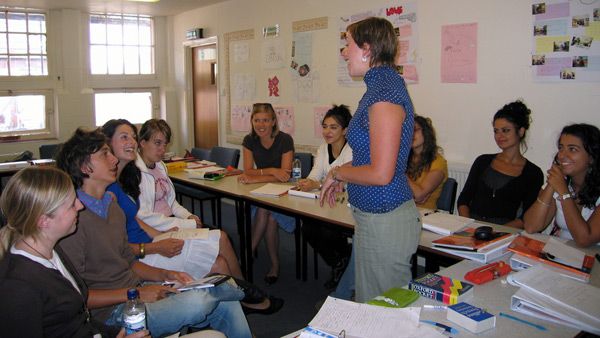What kind of job gives you the freedom to travel all over the world and find enjoyable, challenging work that makes a real difference to people’s lives?
Or, if you would rather settle down comfortably in one location, that’s easy too.
Language teaching is a career that lets you combine your own passion for language with the kind of freedom that most jobs simply cannot offer.
At ESL, we offer refresher courses for practising language teachers and initial training courses for anyone considering the profession. The courses are available both for native speakers and non-native speakers of English, French, Spanish, German and Italian.
Initial teacher training courses

There are many benefits to taking an initial teacher training course at one of our carefully selected partner institutions.
You will develop your skills with input from qualified and highly experienced teacher trainers. Typical trainers on a CELTA course, for example, will have taught English in various places around the world and have years of experience both teaching students and teaching teachers. As a trainee teacher, watching an experienced master at work can be inspirational and you will pick up plenty of tricks of the trade.
The other trainees on the course are also key contributors to your experience. They will come from a range of backgrounds and add something to the mix of the group. There is always an element of group work involved, often in planning lessons.
What will you learn on an Initial course?
An initial teacher training course typically lasts four weeks and introduces you to the skills needed to be a language teacher. Lesson planning is an important part, controlling the classroom is another. You will learn about the resources available to help make your job easier and you will be taught about the theory of teaching and learning, including how it applies to different audiences. You will also learn how it feels to stand in front of a class of students, how your behaviour influences theirs and what separates good teachers from great ones.

Initial teacher training courses assume you have an excellent level of the language you wish to teach and there is usually a pre-course test or interview to confirm that you meet the criteria.
A world of opportunities
Once you have your initial teacher training qualification, you can find work almost anywhere in the world where there is a need for the language you teach. Particularly if you are an English teacher, this means that opportunities await everywhere from major cities to small towns. A recognised qualification will really make your job application stand out from the pile of CVs.
Private language schools employ teachers. If you want to teach English in the UK, Australia, Canada or anywhere else where it is locally spoken, the work for new teachers is often seasonal and concentrated around the school and university holidays when younger learners arrive to study and have fun. Experienced teachers can also find work throughout the year, although this is harder to come by.
If your goal is to travel, you can find year-round work in plenty of exciting locations around the world. Schools need good teachers to provide classes for local learners.

When planning where you would like to teach, bear in mind that some destinations are more competitive than others. You won’t be the only qualified teacher applying to teach English in Barcelona, Madrid or Berlin, for example, which means that schools can be more selective and offer less enticing conditions. If your goal is to work in a major city, be sure to do your research before arriving and contact schools about possible opportunities. But these major cities also have a larger number of potential employers and a large community that revolves around the language schools… you need to be persistent and opportunities will come.
Outside of the major cities in the developed world, your employment prospects will be excellent with your teaching qualification. Even smaller cities in wealthy countries provide plenty of opportunities for qualified teachers… and the chance to earn good money.
You can also teach a language privately, or through an agency that matches teachers with students. Teaching one-to-one or in a small group is often much more intense but the work can pay better, especially if you are teaching business learners.
In many parts of the world, you can work in state or private schools teaching languages. This work is steady, respectable and usually relatively well paid.
What are the entry requirements for an initial language teacher training course?
Different courses and centres have slightly different requirements and you can find out the details for each individual course on our website. Many require fluency and an undergraduate degree, although applicants with relevant experience will also often be accepted.
What about online teacher training courses?
Whereas you can learn some of the theory from an online course, you will not get the practical elements or the collective experience that comes with taking a teacher training course at a respected teacher training centre. One of the major elements that you will miss out on is the feeling of standing in front of a class just a day or two into your course. It’s pretty scary… which is why you want to get it out of the way during training as opposed to when you are in front of your first real class!
With our courses, your trainers will also be able to give you practical feedback on your teaching technique and ways to improve your interaction with the students.
Refresher courses for language teachers
If you are already working as a language teacher and would like to refresh your skills, a refresher course may be just what you need. We have a wide range of refresher courses for teachers of English, French, German, Italian and Spanish, many of which are designed to meet specific training needs. For example, CLIL courses are becoming increasingly popular, as are courses that introduce the use of technology in the language teaching classroom.

Our courses are offered in partnership with leading teacher training centres in exciting locations, so you can combine an active holiday with career development. What’s more, if you can make a persuasive argument and have a knack for application forms, the European Union could fund your course.
There are a wider range of options for teachers of English, but there are still exciting opportunities for teachers of other languages.
Courses for native or non-native speakers
Some courses focus only on methodology while others mix methodology with a language refresher. The courses that mix methodology and language work are especially useful for teachers working in an environment where they are not surrounded by the language they teach. Often, they will be the only teacher at their school with such an advanced level of the language, making it harder to stay fully engaged with it.
But courses that do not specifically include language tuition will also benefit candidates as they are taught in places where the language is spoken day in, day out. Being immersed in a culture is the best way to reconnect with it. All of our courses come with exciting, optional cultural activities that will help candidates to discover the locations.
Discover the latest developments in teaching methodology

When you are teaching, it can sometimes be hard to find inspiration for your classes, especially if you have been teaching for a number of years. While the basics of good teaching change little, the approaches that are available to teachers are constantly developing.
The influence of technology in the classroom has made a big difference to language learning in recent years. The internet and mobile phones with high quality photo and video capabilities have made classroom activities possible that would have only been available in high-tech classrooms a decade ago.
Another key recent trend in language teaching is the spread of CLIL – Content and Language Integrated Learning. The idea is to teach subjects other than modern languages in a foreign language. For example, as English is the international language of business, a subject like economics or business studies would logically be taught in English. This approach takes some of the unique techniques found in the language classroom and applies them to other disciplines.
Even if you are just looking for some new ideas for lessons, a refresher course is the perfect way to find inspiration. Your trainer will have plenty of ideas, as will the other experienced teachers in your group.
Active holidays

We have chosen some of the most exciting destinations for these programmes and our partner centres offer diverse and enjoyable activities to complement the study. For example, you can combine an Italian teacher training course in Rome with cultural visits around the Italian capital, a French teacher training course in Nice with watersports on the Côté d’Azur, an English teacher training course in Oxford with trips to the ancient colleges.
Combine study with cultural activities in a great town which speaks the language you teach; not only will your methodology develop from your time in the classroom, but you will enjoy all the benefits of full linguistic immersion. And you can enjoy a fun holiday!


